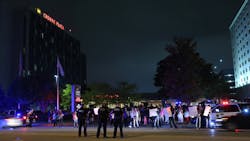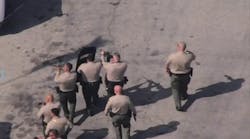CHICAGO -- Video released by Rosemont police seemed to solve at least part of the Kenneka Jenkins mystery.
The surveillance recordings depict Jenkins, 19, staggering alone through a kitchen of the Crowne Plaza Chicago O'Hare Hotel and around a corner where a walk-in freezer is located. Though the camera doesn't capture her entering the freezer, no one else appears in that part of the room until a hotel worker finds her body 21 hours later.
Convincing proof Jenkins did not meet with foul play? Far from it, according to many engrossed by the case.
"Look right there in that doorway!" a woman shouted on YouTube, pointing to a shadowy corner of a hallway. "That's somebody right there."
"I think someone was with her," an observer wrote in a 34,000-member Facebook group dedicated to the case. "Maybe they knew where all the cameras (were) and avoided them. They could've been calling her name!"
"That was not Kenneka in that video," a Twitter user opined. "Clothes, hair and weight don't match. ...Try again."
From President Kennedy to Princess Diana, shocking deaths often generate theories that diverge sharply from the official stories. But the still-developing case of Kenneka Jenkins — which police have said is a death investigation, not a homicide probe — is spawning alternate explanations at a furious rate, many of which exhibit deep skepticism that authorities are telling the truth.
"They had (time) to edit, and remove and add anything they wanted to that video," said LaTyra Goodman, a Chicagoan who was among dozens of protesters outside the hotel Monday night. "There's been a video (online that shows) how you can edit videos and remove a person from them. We've seen this with our own eyes. Why trust the Rosemont police?"
Jenkins was attending a party in a room of the Crowne Plaza in the early hours of Sept. 9 when she went missing. Her mother, Tereasa Martin, sought police assistance a few hours later, but a dispatcher told her Jenkins might have gone to a friend's place or passed out after drinking too much.
Crowne Plaza staff eventually searched public areas of the hotel, and were later joined by Rosemont police. At 12:24 a.m. Sept. 10, according to video released by the village, a hotel worker went around the corner in the kitchen and emerged a few seconds later to summon police.
"I have that subject in the kitchen, in a freezer," an officer told a dispatcher over the radio. "She is frozen solid."
The Cook County medical examiner's office has yet to pronounce a cause of death, saying further tests and investigation are needed.
Martin has retained attorneys — Larry Rogers Jr. and Sam Adam Jr. — who say they plan to conduct their own investigation and perhaps seek a second autopsy. She has also called for the FBI to take over the case, though Rosemont police Chief Donald Stephens III said his department will retain jurisdiction.
Det. Joe Balogh, spokesman for the department, said police have released all the video they have — 36 hours in total — and that they have not altered any of it.
"Everything we have put out has been the original," he said.
But that hasn't eased suspicions online and among protestors who have converged on the hotel on a near-nightly basis, stirred by the strange circumstances of the death and Martin's complaints about the initial response from hotel staff and police.
Monday night, some in a crowd of about 50 held signs accusing the hotel of a cover-up and chanted for authorities to release "the real tape" — one they believe would show definitively what happened to Jenkins.
"All they gotta do is just give (Martin) that tape so she can have justice for her baby," said Charles Harris, a Chicagoan who was among the demonstrators. "That's all they need to do. That's it. We wouldn't even be out here."
Trust in law enforcement has long been unevenly shared. In the wake of well-publicized shootings of unarmed black men two years ago, only 52 percent of Americans expressed great confidence in the police, according to the Gallup polling organization — a record-tying low.
But while overall confidence has since rebounded to the historical average of 57 percent, black trust has slid even more, with only 30 percent saying they have great confidence in police.
A study published last month by the Urban Institute found that the problem is particularly acute in Chicago, where tension between police and the black community has existed for decades. The study shows that over half the people in largely black areas say their neighborhood police are dishonest, and only 9 percent say police treat people with respect.
Jesse Jannetta, a senior research associate who contributed to the study, said that wariness can produce doubts in murky situations.
"When you get into specific incidents where there's a lot of uncertainty about what happened, you can see that (lack of) trust play out," Jannetta said. "How people feel about the information that's being given out — that's a very immediate trust issue."
Jim Bueermann of the Police Foundation, a nonpartisan police research group, said departments can address local distrust through community meetings and social gatherings. But convincing out-of-towners that they are conducting an investigation fairly and competently — especially when the case is the subject of endless social media speculation — can be a difficult task.
He said enlisting the help of well-known and respected outside agencies can help, as can the quick release of as much information as possible. But in the end, he said, departments have to decide how far they're willing to go to appease skeptics.
"They're probably experiencing a sense that (the Kenneka Jenkins demonstrators) distrust police, period," he said. "That is very difficult to address. And I think in some cases, local officials just have to ignore it."
Tribune reporter William Lee contributed to this story.
Copyright 2017 Chicago Tribune
Tribune News Service



